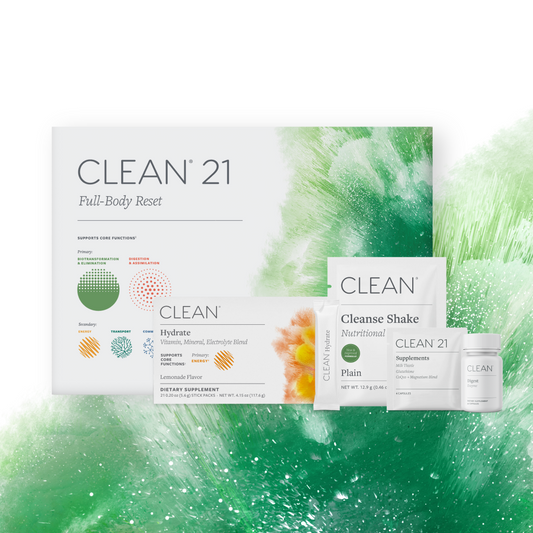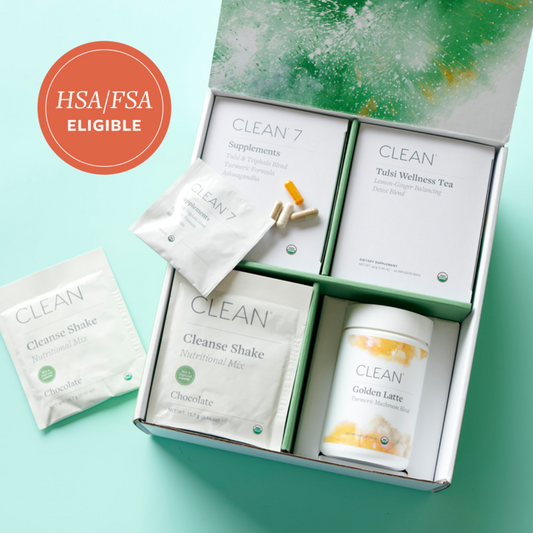
Transitioning Towards Healthier Sweeteners: Why We're Moving Away from Stevia
Learn the ins and outs of stevia and explore alternative natural sweeteners. Uncover the potential stevia sweetener side effects while discovering healthier options.
Sweeteners are a hot topic in the wellness world. As much as we would like to avoid sweets, desserts, and sweetening our coffees, smoothies or other beverages, humans have a long history of enjoying sugar and the sweet taste of foods. Did you know that eating sweet foods served an evolutionary purpose for our ancestors? By eating sweet foods, humans were able to get high-calorie carbohydrates in their diet, providing quick and easy energy sources for their survival.
But, not all sweeteners are created equal! Natural sugars in fruits and vegetables are carbohydrates that provide essential energy, which our body converts to glucose. We need glucose for healthy functioning, but we technically don’t need added sugars. Sugars in processed foods offer little nutritional value and are high in calories. Making smart choices about sweeteners allows us to fuel our bodies for optimal health.
As we know, processed white sugar, raw honey, brown sugar, agave, maple syrup, maple sugar, and many other variations of sugar, are high in calories and can create spikes in our blood sugar levels. Some of these, even if they are natural and otherwise deemed as “healthy”, still have a high glycemic index and caloric content so we still want to be mindful of using these in small amounts. On the other hand, we have the no-calorie artificial sweeteners–such as aspartame, saccharin, and sucralose– which have mounting evidence of their detrimental effects on our health.
In the search for natural sugar alternatives that are also low-calorie and have a low glycemic index, some considerations are stevia, yacon syrup, allulose, xylitol, erythritol, agave nectar, coconut sugar, and monk fruit.
At Clean Program, we have decided to transition away from using stevia in our supplements and powders for several reasons. Although stevia has become popular and widespread in wellness products and is regarded as a better alternative to processed sugars, it affects everyone differently and there are some important considerations to keep in mind when consuming it. As a brand we wanted to take an active step toward better, healthier sweeteners for our customers. Read on to learn about some of the reasons behind our decision and find out about other healthy alternatives.
The Stevia Debate
Health Considerations
Stevia, derived from the leaves of the Stevia rebaudiana plant, is a non-nutritive sweetener containing steviol glycosides, which are compounds extracted and refined from the plant.
Although people opt for stevia as a sugar substitute to lower their calorie intake, the actual stevia powder can be a highly processed sweetener, depending on its quality and additives, if any. Some individuals may be wary of stevia due to concerns about the processing methods used to extract the sweet compounds from the stevia plant. Depending on the process, additives or chemicals may be involved, which can raise health and safety concerns for consumers.
Certain individuals may face a heightened risk of experiencing side effects with regular stevia consumption. Some studies indicate that despite its lack of calories, stevia usage may lead to elevated liver enzymes through intestinal flora modification, raised levels of urea and creatinine, and a decrease in immune signaling that calm inflammation, paired with an increase in signaling that triggers inflammation. Another study showed that stevia use resulted in similar alterations to the gut microbiome as saccharin in people with high fat diets.
Taste and Palatability
In addition to some health concerns with stevia, many people find it bitter or have an unpleasant aftertaste after consuming it. Although taste can be somewhat subjective, consumers are becoming more aware of the different natural sweetener options out there and are able to compare these not only with regards to health but also flavor.
As stevia became widespread, most all health products contained stevia, making it very hard to avoid in the wellness world. Nowadays, consumer preferences have shaped the market and you can find a wider range of options–including yacon, monk fruit, among others–which increases overall enjoyment and adherence to certain programs and protocols and supports their wellness journeys.
Purity Considerations
There are a few forms of stevia that can be obtained from the stevia leaf. In its most natural form, the stevia leaf can be crushed or boiled, resulting in an unprocessed greenish powder or a thick brown liquid extract. Both of these forms can be bitter as well.
The most common form of stevia–and the one we find at the local coffee shops and supermarkets–is the processed and powdered form of stevia. This is a white powder extract typically manufactured massively to package as individual packets. This type of powder is often mixed with fillers such as fructooligosaccharides (FOS), a plant-based fiber, maltodextrin, a food additive derived from cornstarch that may contain MSG, or inulin.
The stevia white powder extract is obtained from the stevia plant through a two-stage process. Initially, steviol glycosides are extracted from the leaves using water, and the resulting extract is dried. In the next stage, additional purification occurs through alcohol/water crystallization, resulting in pure rebiana or stevia extract. One important thing to note is that the chemicals that are added to the process to remove the bitter aftertaste and make the powder white, are often not reported since they represent a small percentage of the formula and stevia preparation.
Knowing what you are consuming and putting into your body is more important than ever to maintain your clean lifestyle and reduce your exposure to chemicals or potentially harmful substances. For sweeteners, how natural and pure they are can make a big difference.

Alternatives We Recommend
There are several natural alternative sweeteners that offer sweetness without the negative health effects associated with refined sugar and artificial sweeteners. They can be incorporated into a balanced diet to help reduce overall sugar intake and promote better health.
Monk Fruit Extract: Also known as Luo Han Guo, monk fruit extract is a natural sweetener derived from the monk fruit. Like stevia, it is non-caloric and does not affect blood sugar levels, making it a suitable option for people with diabetes or those looking to reduce their sugar intake. Additionally, monk fruit extract contains antioxidants called mogrosides, which may have anti-inflammatory and anti-cancer properties.
Xylitol: Another sugar alcohol, xylitol is naturally found in small amounts in fruits and vegetables. It has fewer calories than sugar and does not raise blood sugar levels significantly, making it a suitable option for diabetics. Xylitol also has dental benefits and is commonly used in sugar-free gum and toothpaste due to its ability to inhibit the growth of bacteria that cause tooth decay.
Allulose: Allulose is a rare sugar that is naturally found in small quantities in certain foods, including wheat, figs, and raisins. It has a similar taste and texture to sugar but contains only a fraction of the calories. Allulose does not raise blood sugar levels significantly, making it suitable for people with diabetes or those following a low-carb diet. Additionally, it has been shown to have minimal impact on blood glucose and insulin levels. Allulose can be used as a one-to-one replacement for sugar in recipes and is commonly found in low-sugar or sugar-free products.
Yacon Syrup: Yacon syrup is derived from the roots of the yacon plant, which is native to South America. It has a sweet taste and a dark color, similar to molasses. Yacon syrup contains fructooligosaccharides (FOS), which are a type of soluble fiber that the body cannot digest. As a result, yacon syrup has a low glycemic index and does not cause spikes in blood sugar levels. Additionally, FOS acts as a prebiotic, promoting the growth of beneficial bacteria in the gut and supporting digestive health. Yacon syrup is often used as a natural sweetener and can be drizzled over foods or used in baking and cooking.
Agave Nectar: Derived from the sap of the agave plant primarily found in Mexico, it is known for its high fructose content, which gives it a sweeter taste than traditional sugars. Agave nectar has a relatively low glycemic index compared to other sweeteners since fructose is absorbed more slowly than glucose, resulting in a slower rise in blood sugar levels. However, agave nectar is still a concentrated source of sugars and should be consumed in moderation, especially by individuals monitoring their blood sugar levels.
Coconut Sugar: Derived from the sap of the coconut palm tree, it offers a healthy alternative with a lower glycemic index. It provides a slower and steadier release of energy, making it suitable for individuals managing blood sugar levels. Additionally, coconut sugar contains minerals, antioxidants, and retains a distinct caramel-like flavor due to its natural production process. While it should be consumed in moderation because of its high caloric content, coconut sugar adds nutritional value and flavor to various recipes, making it a popular choice for sweetening beverages and baked goods.
Sweetener comparative chart

While stevia has gained significant popularity in the wellness industry and beyond, some drawbacks associated with stevia include potential health concerns stemming from its processing methods, issues related to taste and palatability, and considerations regarding purity.
It’s always best to read the labels to check for purity in the ingredients, as well as seek reputable brands of sweeteners. We hope the alternatives we outlined above help you make informed decisions on finding natural and healthy ways to sweeten your smoothies and baking.
Our new Cleanse Shakes in our signature full-body reset Clean 21, Daily Shake Superblend and Clean Greens Powder now feature improved flavors with monk fruit as a sweetener. Plus, check out top recipes that showcase alternative sweeteners in our blog, such as these amazing buckeye cookies or this chocolate superfood bark.






